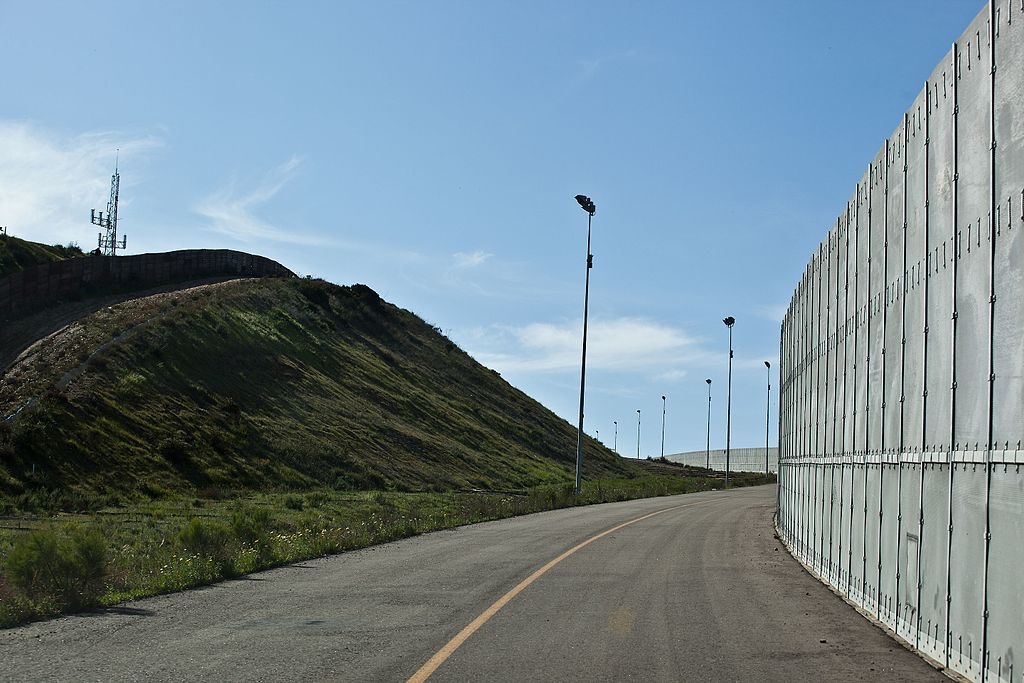In his State of the Union address on January 30, US President Donald J. Trump referred to the brutal murder of two 16-year-old girls from Long Island in December 2016 by members of the “savage MS-13 gang,” responsible for a spate of other gruesome killings in the area, as well.
Many of these gang members, he explained, had entered the United States illegally. “For decades, open borders have allowed drugs and gangs to pour into our most vulnerable communities,” he said.
Calling on Congress “to finally close the deadly loopholes that have allowed… criminal gangs to break into our country,” he listed the four pillars of his immigration-reform proposal:
- A path to citizenship for 1.8 million illegal immigrants who were brought to America by their parents.
- The construction of a “great wall on the southern border” and enforcement by agents patrolling and securing the border.
- Ending the visa lottery, “a program that randomly plans out green cards without regard for skill, merit, for the safety of American people.”
- Ending the “current, broken system” of chain migration of distant relatives, and limiting sponsorships to spouses and minor children.
Although he did not specify this in his speech, Trump reportedly is seeking $25 billion from Congress to fund the wall. Opponents of the wall have been arguing that illegal immigrants do not commit crimes at a higher rate than legal immigrants or native-born Americans; that illegal immigration has been a boon to the economy, rather than a drain on it; and that the cost both of deportation and a wall far exceeds the benefits of both. These claims are repeatedly voiced by the Trump administration’s detractors, as part of their campaign to accuse the president of racism; but what are the facts?
To set the record straight, let us take a look at a number of those that have been obscured or ignored by the media.
As far as the cost of the wall is concerned, a study released in September 2017 by the Federation for American Immigration Reform (FAIR) reveals that, “At the federal, state, and local levels, taxpayers shell out approximately $134.9 billion to cover the costs incurred by the presence of more than 12.5 million illegal aliens, and about 4.2 million citizen children of illegal aliens.” This, the report says, is a nearly $3 billion increase in the cost since 2013. It is also rather more than the single payment of $25 billion that it will cost to build a wall – five and a half times more, and every year.
 Pictured: The US-Mexico border fence near San Diego, California. (Image source: US Customs and Border Protection) Pictured: The US-Mexico border fence near San Diego, California. (Image source: US Customs and Border Protection) |
The same goes for the cost of deporting illegal immigrants. According to Steven A. Camarota, director of research at the Center for Immigration Studies,
“…The average cost of a deportation is much smaller than the net fiscal drain created by the average illegal immigrant,” in part due to the fact that “illegal immigrants overwhelmingly have modest levels of education — most have not completed high school or have only a high school education…creating more in costs for government than they pay in taxes.”
The question of the rates of criminality among illegal aliens vs. those of legal immigrants and American-born citizens has been examined by John R. Lott, Jr., president of the Crime Prevention Research Center, using Arizona’s prison population as a microcosm for study. According to Lott, the ability to measure the crime-rate among illegal immigrants in the U.S. has been difficult, due to many factors, including the lack of a national data base and “primitive” methodology – such as “simple, cross-sectional analysis to see whether areas with higher immigrant populations have higher crime rates,” and “a purely time series approach… look at the United States as a whole and note that crime has decreased since 1990 as immigration has increased.” The advantage of the Arizona Department of Corrections study, Lott says, is that
“over our 32.5-year period, we know each prisoner who entered the prison system, their criminal convictions history, and whether he is a documented or undocumented immigrant. The only mystery is why this type of data has not been utilized until now.”
Peter Kirsanow wryly solved the mystery in National Review, writing:
“Unfortunately, almost every public official not named Jeff Sessions guards against disclosure of illegal-immigrant crime data more tenaciously than disclosure of nuclear launch codes.”
According to Lott, whose research spans 1985-2017:
“Arizona’s prison population data allow us to compare undocumented immigrants’ share of the prison population with their estimated share of the state population…For the first time, we break down the data to examine differences between US citizens, undocumented immigrants, and legal permanent residents. One advantage of using convictions rather than just reported crimes is that convictions depend on a ‘beyond a reasonable doubt’ standard of evidence and thus are much less likely to count innocent people.”
The findings are unequivocal, as the following summary illustrates:
“Undocumented immigrants are at least 142% more likely to be convicted of a crime than other Arizonans. They also tend to commit more serious crimes and serve 10.5% longer sentences, more likely to be classified as dangerous, and 45% more likely to be gang members than U.S. citizens…There are dramatic differences between in the criminal histories of convicts who are U.S. citizens and undocumented immigrants…
“[Y]oung undocumented immigrants commit crime at twice the rate of young U.S. citizens. These undocumented immigrants also tend to commit more serious crimes. If undocumented immigrants committed crime nationally as they do in Arizona, in 2016 they would have been responsible for over 1,000 more murders, 5,200 rapes, 8,900 robberies, 25,300 aggravated assaults, and 26,900 burglaries.”
These numbers do not even include the cost to American taxpayers of the toll taken on America’s children by illegally imported drugs. Although available information on this is at best spotty, the key finding from the DEA’s 2017 National Drug Threat Assessment is that the “most commonly reported greatest drug threat was heroin, at 44.1 percent of law enforcement responses… This was followed by 29.8 percent of respondents indicating methamphetamine was their greatest drug threat, 9.3 percent reporting controlled prescription drugs…”
This tells us something about the extent of the problem, but not enough. The 2010 drug-threat assessment, released a year after the previous administration took office, revealed that,
“From January through November 2009, U.S. seizures of illegal drugs in transit exceeded 1,626 metric tons, indicating that DTOs succeed in moving several thousand tons of cocaine, methamphetamine, marijuana, heroin, and MDMA into the United States annually. There are unique smuggling and transportation methods…”
In 2015, included in the DEA’s drug-threat assessment was the fact that drug overdoses killed more people in the United States than car accidents or guns. As was noted by the BBC at the time, “Many of these drugs are smuggled in large volumes by drug cartels…”
The late Democrat Senator Daniel Patrick Moynihan famously said, “Everyone is entitled to his own opinion, but not to his own facts.” His successors in Congress would do well to remember this while debating the issue of illegal immigration. They certainly need to keep it in mind when voting on the administration’s proposed plan.
Ruthie Blum is the author of “To Hell in a Handbasket: Carter, Obama, and the ‘Arab Spring.'”

























